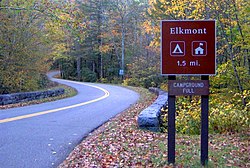Elkmont Historic District, Great Smoky Mountains National Park | |
 Elkmont, Tennessee | |
| Location | Off TN 73 SW of Gatlinburg |
|---|---|
| Nearest city | Gatlinburg, Tennessee |
| Coordinates | 35°39′20″N 83°35′4″W / 35.65556°N 83.58444°W |
| Architectural style | Late 19th And Early 20th Century American Movements, vacation cabins;hotel |
| NRHP reference No. | 94000166[1] |
| Added to NRHP | March 22, 1994 |
Elkmont is a region situated in the upper Little River valley of the Great Smoky Mountains of Sevier County, in the U.S. state of Tennessee. Throughout its history, the valley has been home to a pioneer Appalachian community, a logging town, and a resort community. Today, Elkmont is home to a large campground, ranger station, and historic district maintained by the Great Smoky Mountains National Park.[2]
The Little River Lumber Company established the town of Elkmont in 1908 as a base for its logging operations in the upper Little River and Jakes Creek areas. By 1910, the company began selling plots of land to hunting and fishing enthusiasts from Knoxville, who established the "Appalachian Club" just south of the logging town. In 1912, a resort hotel, the Wonderland Park Hotel, was constructed on a hill overlooking Elkmont. A group of Knoxville businessmen purchased the Wonderland in 1919 and established the "Wonderland Club." Over the next two decades, the Appalachian Club and Wonderland Club evolved into elite vacation areas where East Tennessee's wealthy could gather and socialize.[2]
Upon the creation of the national park in the 1930s, most of Elkmont's cottage owners were given lifetime leases. These were converted to 20-year leases in 1952 and renewed in 1972. The National Park Service did not renew the leases in 1992, and under the park's general management plan, the hotel and cottages were to be removed. In 1994, however, the Wonderland Hotel and several dozen of the Elkmont cottages were listed on the National Register of Historic Places as Elkmont Historic District, Great Smoky Mountains National Park, sparking a 15-year debate over the fate of the historic structures. In 2009, the National Park Service announced plans to restore the Appalachian Clubhouse and 18 cottages and outbuildings in the Appalachian Club area (which were older and more historically significant) and remove all other structures, including the Wonderland Annex (the main hotel had collapsed in 2005).[3]
- ^ "National Register Information System". National Register of Historic Places. National Park Service. March 13, 2009.
- ^ a b Thomason, Phillip and Williams, Michael. National Register of Historic Places Registration Form for Elkmont Historic District. April–July 1993, pp. 7-13. PDF file.
- ^ National Park Service – Planning, Environment and Public Comment, Elkmont Historic District General Management Plan Amendment and Environmental Impact Statement. Retrieved: 18 July 2009.

